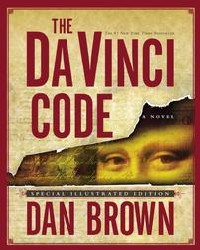Lawyer declares unfair to suggest “Da Vinci Code” copied from earlier book
A lawyer for the publisher of blockbuster thriller "The Da Vinci Code." chipped away Thursday at the claims of two authors who allege copyright infringement, forcing one of them to concede that a key plank of the case is wrong.

Michael Baigent and his co-author Richard Leigh are suing Random House at Britain 's High Court over the copyright of their 1982 book, "The Holy Blood and the Holy Grail." They claim Brown's best seller "appropriated the architecture" of their work, which explores theories that Jesus married Mary Magdalene, the couple had a child and the bloodline survives.
In court documents, they claim that a synopsis Brown sent to publishers pitching his thriller contained key themes from their non-fiction book, presented in the same order. Under cross-examination by Random House lawyer John Baldwin, Baigent acknowledged the points were not in the same order.
"You're right Mr. Baldwin," he said.
If the writers succeed in securing an injunction to bar the use of their material, they could hold up the scheduled May 19 release of "The Da Vinci Code" film starring Tom Hanks.
Random House lawyers argue that the ideas in dispute are so general they are not protected by copyright.
During a third day cross-examining Baigent, Baldwin argued that many of the ideas in "The Holy Blood and the Holy Grail" did not feature in Brown's book, a mixture of code-breaking, art history, religion and mystical lore that has sold more than 40 million copies since it was published in 2003.
Baigent insisted that "our basic conclusion was the fundamental theme of 'The Da Vinci Code."'
But he acknowledged that some of the "details and incidents" in the earlier book were not in "The Da Vinci Code."
"Mr. Brown was writing a novel, and these kinds of finer details of history presumably weren't at the forefront of his mind," Baigent said.
Baldwin suggested that "The Da Vinci Code" account of the founding of the medieval order of the Knights Templar, which contains an inaccurate date, did not come from "The Holy Blood and the Holy Grail."
"My conclusion would be I've got no idea where Mr. Brown got his information from," Baigent said. "He didn't get it from me."
Leigh is scheduled to take the stand after Baigent, with Brown to follow on Friday or Monday.
The third author of "The Holy Blood and the Holy Grail," Henry Lincoln, is not involved in the case. A lawyer for the plaintiffs, Paul Sutton, refused to say why he was not participating.
Lincoln, who is in his 70s and reportedly in poor health, could not be reached for comment, reports the AP.
D.M.
Subscribe to Pravda.Ru Telegram channel, Facebook, RSS!


